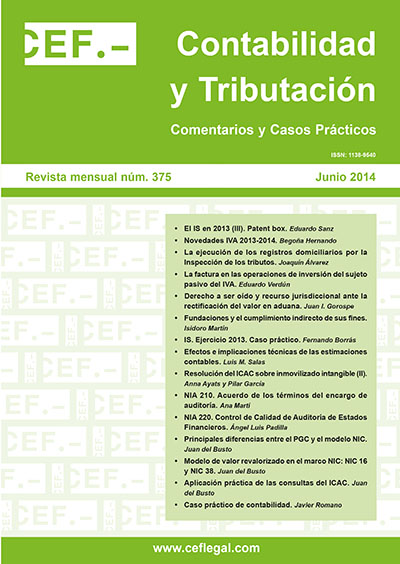Efectos e implicaciones técnicas de las estimaciones contables
DOI:
https://doi.org/10.51302/rcyt.2014.6195Palabras clave:
estimaciones contables, seguridad jurídica, valor razonable, contabilidad creativaResumen
En nuestro Derecho Contable actual, no existen pocas situaciones en las que la norma permita al empresario valorar y registrar sus transacciones con base en estimaciones y juicios de valor. En otras ocasiones, se le concede la facultad de optar por el uso de un criterio valorativo de entre varios admitidos.
Aunque no aboguemos por la necesidad de un ejercicio de exceso de rigurosidad normativa, dada la incidencia que las estimaciones contables pudieran tener en el ámbito tributario y la posible influencia de aquellas en la toma de decisiones por parte de los usuarios de la información financiera, quizá sí cabría una reflexión administrativa acerca de cómo limitar los efectos de la subjetividad permitida, aumentando así la seguridad jurídica.
En el presente trabajo, abordaremos la problemática de algunas estimaciones desde la perspectiva contable, fiscal, analítica y de auditoría, expondremos ejemplos de las implicaciones de las mismas y realizaremos propuestas encaminadas a mitigar sus efectos.
Descargas
Citas
Amador Fernández, S. [2012]: «Contabilidad Creativa», RCyT. CEF, n.º 347.
Amat Salas, O. y Elvira Benito, O. [2008]: «La manipulación contable: tipología y técnicas», Partida Doble, n.º 203.
Apellániz Gómez, P. [1991]: «Una aproximación empírica al alisamiento de beneficios en la banca española», Revista Española de Financiación y Contabilidad, vol. XXI, n.º 66.
Flórez López, R. [2009]: «Problemática contable de las provisiones, cambios en criterios contables, errores, estimaciones y hechos posteriores al cierre», Pecvnia, Monográfico.
García Delgado, S. e Ipiñazar Petralanda, I. [2005]: «La auditoría del valor razonable (ISA 545): implicaciones, responsabilidades y riesgo del auditor», Partida Doble, n.º 169.
Malvárez Pascual, L. [2011]: «El principio de preferencia del fondo sobre la forma en el derecho contable español», RCyT. CEF, n.os 341-342.
– [2011]: «La incidencia del principio contable de prioridad del fondo económico sobre la forma jurídica en el método de determinación de la base imponible del Impuesto sobre Sociedades y su aplicación por los operadores jurídicos», Documentos-Instituto de Estudios Fiscales, n.º 12.
Martínez Arias, A. y Fernández Rodríguez, E. [2011]: Contabilidad de los impuestos empresariales, Madrid: Consejo General de Economistas.
Monterrey Mayoral, J. [1997]: «Entre la contabilidad creativa y el delito contable, la visión de la contabilidad privada», Ensayos sobre Contabilidad y Economía. En homenaje al profesor Sáez Torrecilla. Tomo I.
Naser, K. [1993]: Creative Financial Accounting. Its nature and use, Londres: Prentice Hall.
Navarro Sanchís, F. [2012]: «Una extravagancia de la Administración», Boletín IURIS&LEX de el Economista. n.º 37.
Ruiz Lamas, F. [2009]: «La nueva NIIF para pyme: parecidos y diferencias con el PGC», Partida Doble, n.º 216.
Villarroya Lequericaonandia, M. B. [2003]: Alteraciones y manipulaciones de la Contabilidad, Tesis Doctoral.















